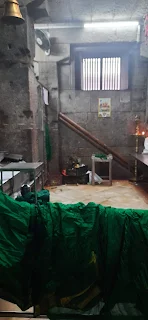Rāma then takes Sītā, near the river Mandākinī and shows her round the pretty scenes. He says that this place is better than Ayodhyā.]Afterwards getting down from the mountain, Rāma showed Sītā the charming auspicious water of river Mandākinī.
The lotus eyed Rāma told the broad hipped daughter of king of Videha who had a pretty full moon like face.
"Look at this Mandākinī with varied type of sand banks, lotus flowers and see the Geese and swans swimming in it."
"See this sparkling river with trees laden with fruits and flowers growing everywhere on its banks resembling the lake Nalinī of the king of kings."
"Just now the water has been drunk by herds of deer, descending in to the river through landing places and making it turbid and this gives me great pleasure."
"Darling, the sages adorned with matted locks, wearing skin and bark as upper cloth are immersing in river Mandākinī at the appointed time."
"Oh broad eyed one; some other sages with rigid austerities are worshipping the sun God lifting their arms."
"With all tree tops swaying in the wind and shedding their leaves and flowers, the entire mountain seems to be dancing."
"At some places the water of the river is clear as the crystal, at some other places it has shining sand dunes and at other places crowded with sages."
"See the heaps of flowers fallen from trees shaken by the wind and other large masses of flowers floating in the middle of the river."
"Oh Lady who does good, oh sweet voiced one, the Chakravāka birds are cooing in sweet voice and are alighting on the heaps of flowers."
"Oh lovely one, Viewing the Mandākinī river and Chitrakūṭa mountain your presence, I consider, is more pleasant than living in Ayodhyā."
"The Sidhas endowed with penance, self-restraint and peace are completely washed of all their sins by taking bath in this agitated water. You may enter its waters with me."
"Oh pretty Sītā, you may enter the river Mandākinī with red lotuses and white lotuses submerged in it."
"Oh lady, imagine always that these wild animals are the citizens, Chitrakūṭa as Ayodhyā and this Mandākinī river as Sarayu river."
"Oh Vaidehī, the soul of Dharma Lakṣmaṇa obeys all my wishes and you also favour all my wishes, causing lot of pleasure to me."
"Bathing thrice at the time of ritual prayers, partaking honey, fruits as well as roots in your company, I do not wish for Ayodhyā or the kingdom."
"This pretty river is blessed with lots of deer. Elephants, lion and monkeys come to drink water in it. It is decorated with plants in full bloom. There does not exist any other place which removes fatigue like this one."
Like this Rāma the perpetuator of the clan of Raghu, talked of many aspects about this river in the company of his beloved and they both wandered in the Chitrakūṭa Mountains, resembling the hue of the collyrium.
This is the end of Ninety Fifth Sarga of Ayodhyā Kanda which occurs in Holy Rāmāyaṇa composed by Vālmīki as the First Epic.





